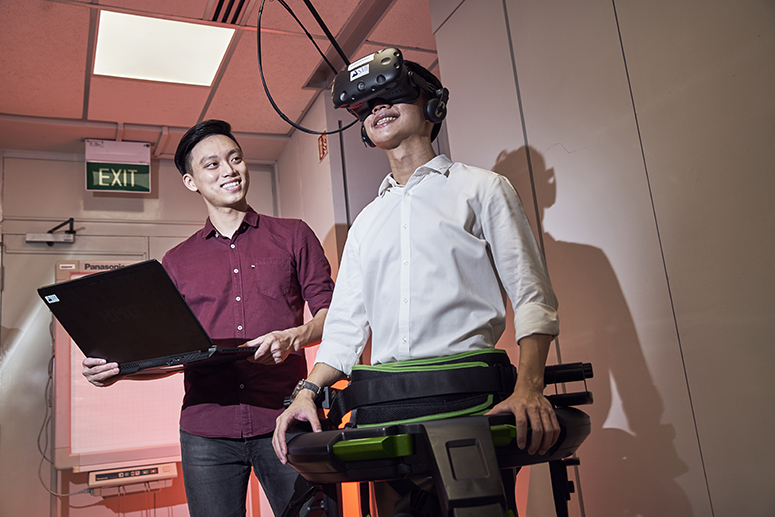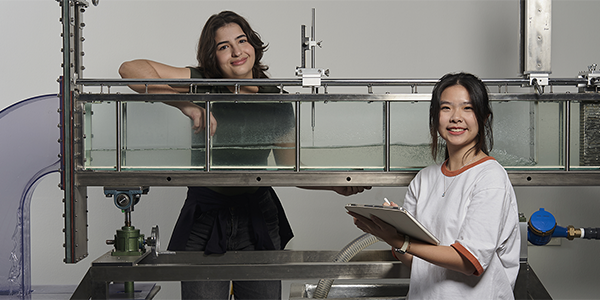Bachelor of Engineering (Civil Engineering)
Civil Engineers play a vital role in shaping sustainable cities by delivering essential urban solutions — ranging from housing and transportation to clean water supply and sanitation. In today’s world, their responsibilities extend even further, as they take on the critical challenge of safeguarding coastal regions against the threats of rising sea levels.
At NTU-CEE, you will be empowered to join the next generation of civil engineers, driving innovations that transform the way society lives and shape a sustainable future for generations to come.
Accreditation
Our Bachelor of Engineering (Civil Engineering) programmes are accredited by the Institution of Engineers Singapore (IES) through its Engineering Accreditation Board (EAB). IES is the Singapore signatory of the Washington Accord - an international agreement that evaluates the degree to which engineering academic programmes equip their graduates with the skills required for practising engineering at the professional level.
Programmes Offered

The 4-year direct honours Civil Engineering programme provides a unique engineering education that equips our students to address the challenges of sustainability in future cities, while preparing them for careers related to Urban Infrastructures & Solutions.
The civil engineering courses in the programme can be broadly categorised into Infrastructure Development and Urban Solutions.
Infrastructure development
- Structural Analysis
- Project Management & Planning
- Engineering Geology & Soil Mechanics
- Construction Technology & Processes
Urban solutions
- Civil Engineering & Sustainable Built Environment
- Water Resource Engineering
- Environmental Engineering
- Coastal Engineering
- Inland and Coastal Flood Management
- Transport Engineering
- Highway Engineering
Curriculum Structure with Professional Internship (PI)
| Academic Unit Requirement | |||
|---|---|---|---|
| Major Requirements (Core + Major PE) | 80 + 3 | ||
| Interdisciplinary Collaborative Core (ICC) – Common Core | 14 | ||
| Interdisciplinary Collaborative Core (ICC) – Professional Series | 16 | ||
Interdisciplinary Collaborative Core (ICC) – Care, Serve, Learn | 3 | ||
| Broadening and Deepening Electives (BDE) | 20 | ||
| Total | 136 | ||
Minor
Students can acquire multiple skills and broader knowledge beyond what their major discipline may provide, from minor programmes.
There are more than 45 minors available in NTU. Students will not be offered a minor in the same field as his major (single degree, double degree or double major programme). Students intending to pursue a minor are to indicate their intention and when they have fulfilled the minor requirements, they are to file for the award of the minor. The award of minor will be reflected in a graduate’s transcript but not his degree certificate. No additional certificate will be issued.
Specialisations
CEE offers 5 niche specialisations that enable Civil Engineering students to gain deeper expertise in their chosen field and enhance the value of their degree. Each specialisation is formally recognised on the academic transcript, giving graduates a competitive edge in their career pursuits and providing a strong foundation for further studies.
Choose from these Specialisations available to Civil Engineering students:

Bachelor of Engineering (Civil Engineering)
SkillsFuture Work-Study Degree Programme
Enhancing Students' Job-Readiness
The Committee on the Future Economy has recommended the introduction of new modalities of education and training at the Institutes of Higher Learning as there are tangible benefits for students to be exposed to on-the-job training (OJT). CoE's SkillsFuture Work-Study Degree (WSDeg) programmes are purposed to enhance students’ readiness for the workplace after graduation by integrating institution-based learning with structured OJT in partnership with employers. Students benefit from greater exposure to the professional work environment, allowing them to learn on the job, acquire and deepen jobskills, and cultivate an understanding of real-world practices through multiple internships, culminating in an industry-sponsored WSDeg Final Year Project (FYP).
Programme Structure
The WSDeg comprise approximately 54 weeks of OJT and industry-sponsored FYP integrated into the 4-year undergraduate curriculum. The OJT components include:
| Year 1 | Year 2 | Year 3 | Year 4 | ||||||||
| SEM 1 | SEM 2 | S-SEM | SEM 1 | SEM 2 | S-SEM | SEM 1 | SEM 2 | S-SEM | SEM 1 | WINTER | SEM 2 |
| CW | CW | N.A. | CW | CW | WORK TERM 1 | WORK TERM 2 | CW | WORK TERM 3 | FYP + CW | WORK TERM 4 | FYP + CW |
| BLOCK 1 | BLOCK 2 | BLOCK 3 | |||||||||
| DISCOVERY / EXPLORATORY STAGE | DEEPENING & ENHANCING WORK-READY SKILLSETS STAGE | ||||||||||
- Work Term 1: PA (10 weeks in Year 2 Special Semester from May to Jul; 5 AU)
- Work Term 2: PI (20 weeks in Year 3, Semester 2 from Jan to May; 10 AU)
- Work Term 3: PA (11 weeks in Year 3 Special Semester from May to Jul; 5 AU)
- Work Term 4: PA Winter (5 weeks in Year 4 Winter from Dec to Jan; 3 AU)
- WSDeg Final Year Project (FYP): (40 weeks in Year 4 Semester 1 & 2, minimum 8 hours/week; 8 AU)
Note:
- Block 1 & 2: These Discovery/Exploratory blocks allow students to develop foundational skillsets and fundamental industry insights before commitment to a focused job role/function. Students may choose to stay with the same company for both Work Term 1 and 2, or select a different company for each Work Term.
- Block 3: Students are expected to commit to one of the companies they have engaged with in earlier work terms (either Work Term 1 and/or 2).
- The AU for the 3 PA in Work Term 1, 3 and 4 will be drawn from students' Broadening & Deepening Electives (BDE). Interested students should plan their studies accordingly to free up 13 AU of BDE for the 3 PA.
How to Apply
In Year 2 Semester 1, students will receive an email invitation to apply.
Tuition Fees
The tuition fees for the WSDeg are pegged to the fees for the corresponding Bachelor of Engineering or Bachelor of Science programme.
Accelerated Bachelor Programme (ABP)
The Accelerated Bachelor Programme (ABP) is offered by invitation to eligible first-year students based on strong academic results.
Students who maintain strong academic performance may complete the programme in 3.5 years instead of the standard 4 years. Achieving early graduation requires careful curriculum mapping and timetable planning.
NTU-University Scholars Programme (NTU-USP)
The NTU–USP experience offers a vibrant student life. Our co-curricular enrichment activities include seminars by distinguished professors, professional development programmes, and NTU–USP scholar-led initiatives.
Renaissance Engineering Programme (REP)
The Renaissance Engineering Programme (REP) is an integrated, rigorous, and fully residential programme with a curriculum that covers a broad spectrum of multidisciplinary subjects, bridging Engineering, Business, and the Liberal Arts, which includes Sciences, Mathematics, Engineering Technology Management, and interdisciplinary studies.
This programme includes a one-year overseas experience at a partnering university such as University of California, Berkeley, Imperial College London, University of British Columbia, University of Toronto or University of Waterloo with a Professional Attachment in Year 3, and it awards a dual-degree comprising Bachelor of Engineering Science degree (with specialisation in a chosen engineering discipline) and Master of Science in Technology Management in 4.5 years.
CN Yang Scholars Programme (CNYSP)
The CN Yang Scholars Programme (CNYSP) nurtures future leaders at the interface of science and engineering. It focuses on technological innovation and scientific communication and requires strong science and engineering training.
It features multidisciplinary courses in mathematics, research, making and tinkering, internship, and global learning, designed to prepare you to lead in the next phase of technological evolution.
Embark on this unique journey to truly embrace the spirit of innovation, persistence, and social capita so that you can make an impact in any of the diverse range of careers available to you in the future.
Second Majors
A Second Major programme provides students with a breadth of exposure and is also designed to offer greater depth of study in an additional discipline compared to a minor.
The award of a second major will be reflected in a graduate's transcript, but not the degree certificate. A separate certificate for the award of a second major will be issued.
Civil Engineering students can enhance their degree by choosing one of the following Second Majors:

Bachelor of Engineering (Civil Engineering) and Bachelor of Social Science (Economics)
Double Degree
Apply nowCurriculum Structure with Professional Internship (PI)
| Academic Unit Requirement | |||
|---|---|---|---|
| Major Requirements (Core + Major PE) | 101 + 36 | ||
| Interdisciplinary Collaborative Core (ICC) – Common Core | 14 | ||
| Interdisciplinary Collaborative Core (ICC) – Professional Series | 16 | ||
Interdisciplinary Collaborative Core (ICC) – Care, Serve, Learn | 3 | ||
| Broadening and Deepening Electives (BDE) | 2 | ||
| Total | 172 | ||
List of Economics Courses
| ECON Core | AU | Sem | Pre-requisite |
|---|---|---|---|
| HE1001 Microeconomics I | 3 | S1 | |
| HE1002 Macroeconomics I | 3 | S1 | |
| HE2001 Microeconomics II | 3 | S2 | HE1001 |
| HE2002 Macroeconomics II | 3 | S2 | HE1002 |
| HE2003 Econometrics I | 3 | S1 | MH1820 |
| HE3001 Microeconomics III | 3 | S1 | HE2001 |
| HE3002 Macroeconomics III | 3 | S1 | HE2002 |
| HE3003 Econometrics II | 3 | S2 | HE2003 |
| Total | 24 | ||
| ECON PEs | AU | Sem | |
| MH1820 Introduction to Probability and Statistical Methods | 3 | S2 | |
| Level 3xxx (6 courses) | 18 | S1 / S2 | |
| Level 4xxx (3 courses) | 12 | S1 / S2 | |
| Total | 33 |
Promotion
Promotion to the next year of study is based on the active semesters taken. Students must attain a minimum CGPA of 3.50 for each degree to stay on the programme. Those who fail to attain a CGPA of 3.50 in any of the degrees for two consecutive semesters will be required to drop out of the double degree programme.
GER Electives / Broadening and Deepening Electives
Students may read additional courses* outside their graduating requirements to broaden their knowledge. Such courses will be classified as GER-UE/BDE and included in the GPA for both the BEng and BA / BSocSci (Economics) degrees. These courses may also be used to fulfill the requirements of a minor.
* Courses must not be part of the normal curriculum of either degree.
Admission Requirements

In addition to NTU’s general admission criteria, applicants are expected to fulfil these minimum subject requirements.
| Institution | Requirements |
|---|---|
| Singapore Cambridge GCE 'A' Level | H2 Level pass in Mathematics, and H2 Level pass in Physics / Chemistry / Biology /Computing |
| International Baccalaureate Diploma | Mathematics at Higher Level, and Physics / Chemistry / Biology / Computer Science at Higher Level |
| NUS High School Diploma | Major CAP of 2.0 in Mathematics, and Major CAP of 2.0 in Physics / Chemistry / Biology |
| International and Other Qualifications | Mathematics at Senior High School Level, and Physics / Chemistry / Biology at Senior High School Level, and Physics at Junior High School Level* * Physics at Junior High School level is only applicable to applicants who have not read Physics at Senior High School Level. |
| Polytechnic Diploma | Applicants with relevant diplomas from one of the local polytechnics may apply for admission. |
Admission Enquiries
Contact Office of Admission
Eligibility
Singapore GCE ‘A’ Level, International Baccalaureate (IB) and NUS High School Diploma (NUSHS)
Students with outstanding Singapore GCE ‘A’ Level, International Baccalaureate (IB) and NUS High School Diploma (NUSHS) results may be eligible for exemptions for up to 3 selected first-year courses in the table below.
Courses Available for Exemption & Relevant A Level / IB / NUSHS Subject
| Course | Relevant A Level / IB / NUSHS Subject |
|---|---|
| CV1014 Introduction to Computational Thinking | Computing / Computer Science / Computing Studies |
| MH1810 Mathematics I | Mathematics |
| PH1011 Physics | Physics |
International Science Olympiad Medalists
Exemption / Credit Transfer For International Science Olympiad (ISO) Medalist (Gold, Silver or Bronze Medals only)
| S/N | ISO Competition | Exempted Course |
|---|---|---|
| 1 | International Mathematical Olympiad Competition (IMO) | MH1810 Mathematics I |
| 2 | International Physics Olympiad Competition (IPhO) | PH1011 Physics |
| 3 | International Olympiad in Informatics Competitions (IOI) / International Olympiad in Artificial Intelligence (IOAI) | CV1014 Introduction to Computational Thinking |
Polytechnic Qualifications
| S/N | Criteria |
|---|---|
| 1 | Up to 12 AUs for Major Core, including selected Major Prescribed Electives (MPE), subject to meeting programme-specific exemption criteria. |
| 2 | Up to 6 AUs of Broadening-Deepening Electives (BDEs). |
| 3 | An additional 12 AUs via the Advanced Placement Pathway (APP) with partner Polytechnics for NTU-registered courses taken during polytechnic studies and graded by NTU. |
How to Apply
Students who qualify for course exemptions will be notified by the school via email in mid to late July, and no separate application is required. The email will list the courses granted for exemption, and students may then inform the Undergraduate Office if they wish to accept or decline the exemptions.
Exemption Considerations
Students who are considering course exemptions must ensure that they are truly proficient in the courses to ensure no knowledge gap that may affect their learning in other courses.
Curriculum
Stay ahead of the curve with our industry-relevant and well-rounded curriculum.
Please select the programme to view its curriculum.

Course Content
All courses within NTU are designed using an outcomes-based teaching and learning (OBTL) approach, which begins by stating the desired outcomes.
Find out moreCareer Prospects
Aviation
Changi Airport Group (Singapore) Pte Ltd
Construction
Koh Brothers Group, Expand Construction Pte Ltd, Woh Hup and many more
Defence
Defence Science and Technology Agency (DSTA)
Engineering/Consultancy
Arup Group, JTC Corporation (JTC), Keppel Corporation Surbana Jurong, Meihardt (S) Pte Ltd, Jurong Engineering Limited, AECOM Singapore, CPG Corporation, Engineers 9000 Pte Ltd, WSP Consultancy
Public Utilities
Public Utilities Board (PUB), National Environment Agency (NEA)
Transport
Land Transport Authority (LTA), SMRT Corporation Ltd, SBS Transit
Urban & Infrastructure Planning
Housing and Development Board (HDB), Urban Redevelopment Authority (URA), National Parks Board (NParks), Building and Construction Authority (BCA)
Testimonals
Our Civil Engineering graduates possess the knowledge, skills, and global perspective necessary to succeed in today’s dynamic world. Many have embarked on meaningful careers in infrastructure development, urban solutions, and sustainable city design, driving innovation and creating change across various sectors. Discover their journeys and find out how an NTU CEE education has shaped their careers.

NTU’s Civil Engineering programme built a strong technical foundation that I rely on every day in my career. Core modules in structural engineering, combined with hands-on projects, internships, and real-world design work, sharpened my problem-solving skills and prepared me for professional practice.
The programme’s flexibility allowed me to explore advanced areas such as transport and coastal engineering, while also developing adaptability and resilience—qualities that are essential for thriving in today’s fast-changing engineering landscape.

NTU’s Civil Engineering programme shaped not only my technical expertise, but also the way I think as an engineer. It trained me to approach complex problems systematically, communicate ideas clearly, and apply engineering solutions with purpose — skills I use daily when working with industry partners to improve planning and review processes.
Pursuing a Second Major in Society and Urban Systems broadened my perspective beyond engineering. It introduced me to economic and policy considerations that are essential in real-world decision-making, and ultimately sparked my interest in public-sector policy and planning.
— Mohamed Sufyan Bin Abdul Sukkur
B.Eng in Civil Engineering with Second Major in Society & Urban Systems, Class of 2023

NTU’s Civil Engineering curriculum gave me a strong foundation in engineering design, with professors who clearly break down complex concepts into practical understanding. This preparation not only helped me pass the Fundamentals of Engineering Examination (FEE) in 2024, but also enabled me to confidently address consultants’ feedback and navigate real-world construction processes.
My Second Major in Society and Urban Systems broadened my perspective beyond technical design. It taught me to consider feasibility, human comfort, and environmental impact — helping me understand how every aspect of a project comes together in practice.
— Long Yilin
B.Eng in Civil Engineering with Second Major in Society & Urban Systems, Class of 2023

The academically rigorous NTU CEE curriculum has honed my engineering competencies while broadening my worldview. It separates the lab courses from the actual courses and hence gives more time to cover the content courses, instead of skimming through it to cater for an integrated session within those courses. Through internships, research projects, global exposure, and personal development, I have had no shortage of avenues to learn outside the classroom.
Most importantly, I take pride in the tightly knit community that students have with faculty and staff.
— Muhammad Sofian Bin Mohamed Tahir
B.Eng in Civil Engineering with Second Major in Society & Urban Systems, Class of 2021

NTU’s Civil Engineering programme offers broad exposure across key disciplines — from structural and geotechnical engineering to transportation and environmental engineering — allowing students to discover and pursue their areas of interest with confidence.
The curriculum is practical and industry-relevant, equipping graduates with skills that can be applied immediately in the workplace. As a design engineer, I draw directly on what I learned at NTU in my day-to-day work.
— Thng Xiong Jie Terence
B.Eng in Civil Engineering, Class of 2020

Civil Engineering today goes far beyond traditional construction. At NTU, students are exposed to cutting-edge tools such as robotics, digital modelling, and advanced engineering software that are shaping the future of the built environment.
A Civil Engineering education also opens diverse career pathways. Graduates can pursue roles in structural design, technology-driven engineering solutions, or even specialise in urban planning and development—far beyond the conventional construction track.
— Bryan Goh
B.Eng in Civil Engineering, Class of 2020






